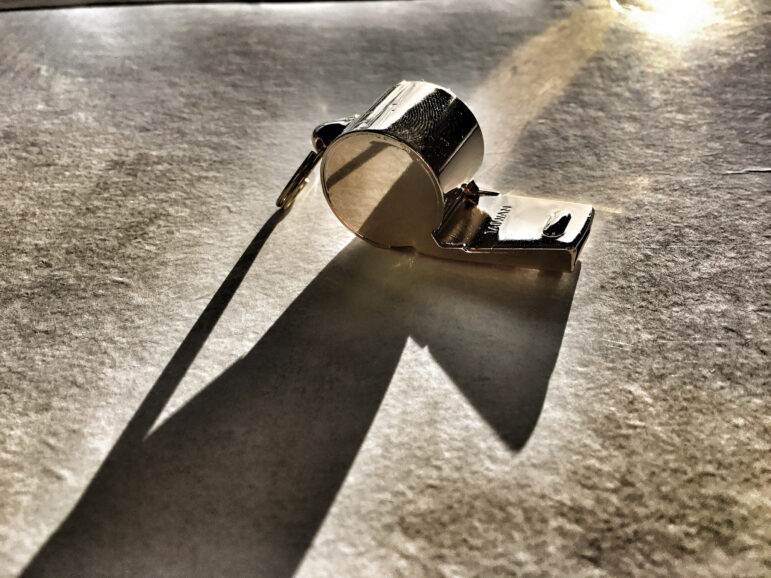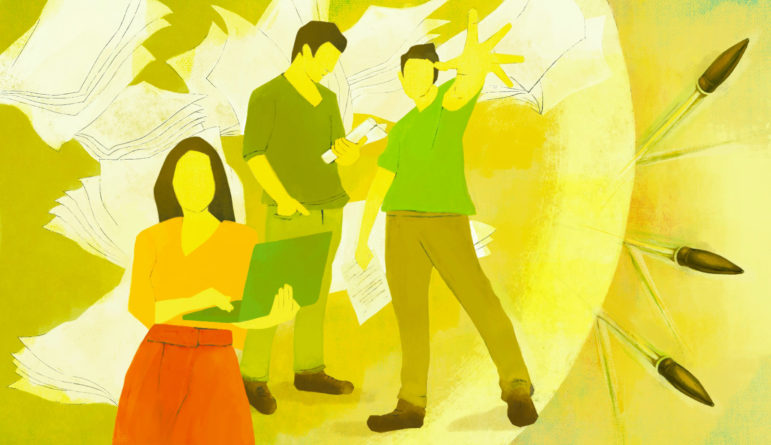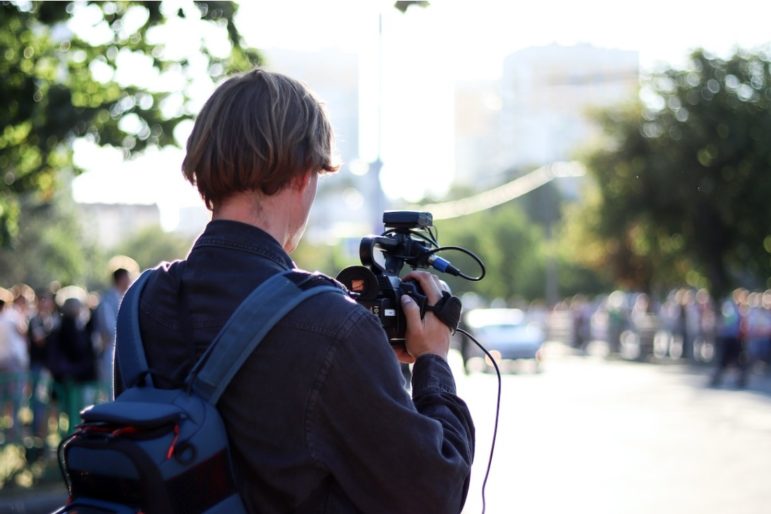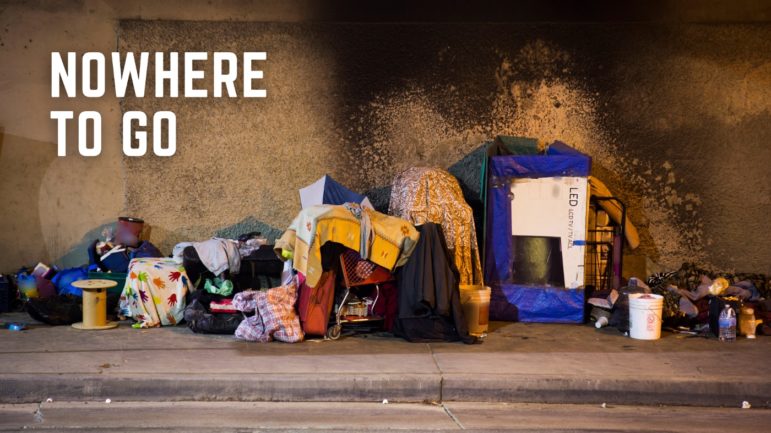

Image: Shutterstock
Tips and Resources for Students on Investigative Journalism
Read this article in
Investigative journalism is a dream profession for many. From “All the President’s Men” — the tale of the Watergate scandal investigation — to more recent films like “The Post,” “Spotlight,” and “She Said,” Hollywood has nurtured the image of the investigative journalist as an intrepid reporter battling to dig into a forbidden story. There’s a certain truth to these films, which may well have sparked vocations, even if the reality of the profession is richer and more complex.
But no one becomes an investigative journalist overnight. And while watchdog reporting still has traditional reporting methods as its bedrock, there are always new tools and innovative techniques that can be added to a journalist’s arsenal to help them in the investigative field.
Becoming an investigative journalist is not out of anyone’s reach, as long as you have the necessary training. This can be at a journalism school or through an apprenticeship, but also, in a less academic way, by relying on free online resources. Another option is to learn the trade “on the job,” following in the footsteps of more experienced journalists. But training isn’t the only thing you’ll need, as with any career path, you’ll also need luck, the right encounters, and some good mentors.
Are you a student interested in studying journalism or investigative journalism? Or are you already a journalist or a self-taught reporter, who wants to learn how to do more in-depth investigative stories, or to dive into data journalism? In this article, GIJN has sought the advice of respected academics and from working investigative reporters who teach the trade, which we complement with resources you can draw on.

A session at the 2023 Global Investigative Journalism Conference in Gothenburg, Sweden. Image: Wolf France for GIJN
1. Understand Investigative Journalism
In their book “The Elements of Journalism,” Tom Rosenstiel and Bill Kovach write that the core of journalism is to provide the public with reliable, relevant, and truthful information to empower them as informed citizens.
But what exactly is investigative journalism? GIJN offers a definition of the profession noting that the dictionary definition of the term “investigation” is associated with the adjective “systematic,” and involves in-depth and original research and reporting. Another characteristic of investigative journalism is that it reveals information that certain people or institutions would prefer to keep hidden. In fact, if an investigation doesn’t reveal anything new, it’s not an investigation.
But beware, a simple document leak is not an investigation either, but can be where one begins. So while the #PanamaPapers, #LuxLeaks, or #UberFiles investigations all effectively started with a massive data leak, these records were then analyzed by journalists and used to get sources talking.
2. Make Sure Investigative Journalism Is “Your Thing”
“Not all journalists have the temperament to become investigative reporters,” notes Claudine Blais, a professor of journalism at the University of Montréal in Canada. As a former editor-in-chief of Radio-Canada’s Enquête, she says she can quickly spot who among her students has “the profile” to do investigative reporting. “Those who make a call, don’t get any feedback and leave it at that, I know won’t make the grade,” she says. “You have to be insistent, make 20 phone calls, not give up quickly, and use strategies to get around difficulties,” she continues, adding that you have to know how to stop with your contacts “just before the ‘no.'”
3. Know That It’s a Serious and Difficult Job
“If you decide to go into investigative journalism, you have to take it seriously,” says Hamadou Tidiane Sy, former vice-president of the Norbert Zongo Cell for Investigative Journalism in West Africa (CENOZO) and director of the E-jicom School of Journalism in the Senegalese capital, Dakar. “Doing good journalism is difficult but doing investigative journalism is even more difficult,” he stresses. “You shouldn’t think that all it takes is for someone to contact you with ‘an explosive file’ and all you have to do is spill the beans. No, there’s a long process of cross-checking before an investigation is published.”
GIJN’s How They Did It section, which goes behind the scenes of leading investigations, can give you an idea of the time and rigor required to complete a story.
4. Always Remember: Ethics
As in all journalism genres, “ethical discipline” is vital, says Pınar Dağ, GIJN’s Turkish editor who is also a lecturer at Kadir Has University in Istanbul. So reporters need to be “honest, fair, and courageous in gathering information, reporting, and conducting the interpretation process,” she says. “One of the ethical codes of investigative journalism is to take great care and sensitivity to minimize harm and to avoid involving vulnerable groups, children, animals, disadvantaged groups, and family members who are not involved in the story,” she advises.
Beyond the moral issue, having high ethical standards lends credibility to your investigation. GIJN regularly tackles this subject, as in this article Is It Ever OK for Journalists to Lie to Get a Story? The chapter on ethics in our Citizen Investigations Guide is also an excellent introduction.

Learn from reading, watching, and listening to game-changing investigations. Here, attendees at the GIJC23 in Gothenburg listen to leading investigative reporters. Image: Heino Ollin for GIJN
5. Read, Listen, and Watch
Every profession advances if not from imitation, then from inspiration, and investigative journalism is no exception. The investigations you read or watch will feed the ones you conduct three, five, or 10 years from now. At a time when investigative formats have never been so varied, reading, seeing, and listening to these investigations is a fundamental step in learning the skills to become a good investigative journalist.
For the best investigations, subscribe to GIJN’s global newsletter (in English) or any of the seven regional newsletters published in other languages, which feature a monthly selection of the best investigations from different parts of the world. Other sources of inspiration are GIJN’s Editor’s Picks series, where our regional editors select the best investigations published that year, and GIJN’s Global Shining Light Award, which honors investigative journalism in a developing or transitioning country, done under threat, duress, or in the direst of conditions.
6. Learn To Identify Stories
“One of the keys to investigative journalism is identifying the subjects to be covered,” says Gaëtan Gras, a journalist at La Libre Belgique and professor of investigative journalism at IHECS, the Brussels School of Journalism and Communication. “You have to be proactive and keep an eye on the news… at the turn of a conversation in your private life, by talking to work colleagues, by reading your newspaper, your news site or the competition, by observing the world around you,” all of these can give you clues and possible story leads, he explains. Gras also urges future investigative journalists to keep up with foreign titles: “Some good investigations are adaptations of stories done elsewhere,” he says. Many GIJN articles are based on case studies, with examples of investigations carried out in one country that can be duplicated elsewhere in the world.
Joël Matriche, an investigative journalist with the Belgian daily Le Soir, says that a subject that has already been covered by others and is in the public domain is not necessarily a “dead” story. “It can happen that the journalist feels that the explanation is not satisfactory, that gray areas remain, and that it would be worthwhile digging deeper,” he points out. In his experience, this sometimes leads to good results, and in the worst case, by making more and more phone calls, a journalist gains new contacts who may well become future sources.
But how do you know if you’ve identified a good subject for investigation? Damien Brunon, head of digital and investigation at the Lille School of Journalism, always urges students to conduct a “pre-investigation” by answering three questions.
- What’s the problem?
- What has already been written on the subject? (Something you can check with an in-depth press review)
- What do I need to report this story? (Consider what documents, what access, and what contacts could be required.)
He stresses: “There is no good investigation without a good pre-investigation.”
7. Get Noticed
Norwegian investigative journalist Tarjei Leer-Salvesen, who teaches at the Universities of Bergen and Stavanger, always advises his students to “get noticed.”
“The bosses in the newsroom keep telling students to learn a little bit of everything, since that makes their own jobs easier. But the trick, in my opinion, is to disobey the call to do everything by making a few outstanding stories that the editor must notice and will like,” he says.
He illustrates his point with several concrete examples:
- If you are into sports, cover them, but combine it with learning the skill to read financial reports, soon you will be the only journalist who understands a sports club’s economic standing.
- If you are keen on covering politics, learn statistics as well. Then you can do more than cover press conferences and can do the data digging that will enable you to call out a politician.
- If you cover city development and planning, become a FOI geek and enrich your coverage with documents nobody else has.
At a French-language masterclass organized by GIJN, investigative journalist Fabrice Arfi, co-head of Mediapart’s investigative team, also recommended being both a “jack of all trades” and having an “editorial home base.” “I believe that this combination, for a young journalist, is a way of getting noticed by department heads and editors-in-chief,” he explained.
GIJN’s Resource Center has a series of guides and stories to help reporters learn how to investigate specific topics like, for example, human trafficking, elections, health and medicine, war crimes, or delve into specific techniques like interviewing, finding expert sources, and online advanced search.
Winning a scholarship or a prize can be a great opportunity to get noticed and make your integration into the job market easier, and GIJN regularly updates a list dedicated to grants and fellowships.
8. When Writing, Think Of Your Readers
The phrase “think of your readers” is repeated in journalism schools and newsrooms across the world. It’s a valuable insight because an investigation must remain digestible, attractive, and interesting for the reader. “You have to simplify and de-complexify a subject you sometimes spend months working on, in order to offer readers the essentials. You must avoid drowning it in insignificant details, even if it means throwing away days or months of work,” recommends La Libre Belgique’s Gras.
“When you write an investigative piece, you have to be sober in your writing… I’m in favor of a kind of factual dryness, a kind of factual brutalism in investigations,” Fabrice Arfi said in the GIJN masterclass.
It might be helpful to read some of the articles featuring “writing tips” available on our website.
9. Cultivate Your Network
Journalism networks and collectives can be very useful not only for forging links with a view to collaboration, but also for finding peers, mentors, partnerships, and contacts. They can also help you maintain your knowledge of the industry. Subscribe, on social networks, to recognized organizations practicing or supporting investigative journalism. The list of GIJN members in your area can be a good place to start. Conferences organized in your region (Dataharvest, the African Investigative Journalism Conference, COLPIN, to name a few) are an excellent way to meet inspiring journalists.
The entry fee may be high, but these major events sometimes offer reduced rates for students or those looking to volunteer in return for access to the roundtables. And don’t forget the Global Investigative Journalism Conference organized by GIJN every two years: a must-attend event for investigative journalists from all over the world. For each conference, a number of journalists from developing countries can attend for free, thanks to fellowship programs.

The Global Investigative Journalism Conference brings together leading professionals to talk about watchdog reporting. Scholarships ensure a number of student reporters are also able to attend and learn their craft. Image: Wolf France for GIJN
10. Never Stop Training
If you’re a student in journalism: make the most of it! But don’t forget that learning continues throughout your professional life. Because data journalism and investigative journalism require technical know-how (using satellite images, finding information no longer online, verifying content, open source research, analyzing data, etc.), it’s essential to keep training, as several journalists interviewed for this article pointed out.
Educate yourself with GIJN’s resources, such as our guides and tipsheets. If you’re just getting started in investigative journalism, don’t miss our resources on avoiding lawsuits, interviewing techniques, fact-checking, working with whistleblowers, starting with video, investigative manuals, and finding sources.
And keep an eye out for our free webinars with renowned investigative journalists, helping to train and inspire journalists around the world, or be inspired by the advice and favorite tools of distinguished investigative journalists. Lastly, students can subscribe to our X/Twitter, Facebook, LinkedIn social media pages, as well as our mailing list.
 Alcyone Wemaëre is a French freelance journalist based in Lyon. She is a former staff reporter for Europe1 and France24 in Paris. Along with being GIJN’s French Editor, she is an associate professor at Sciences Po Lyon where she is co-responsible for the master’s degree in journalism “data and investigation” speciality.
Alcyone Wemaëre is a French freelance journalist based in Lyon. She is a former staff reporter for Europe1 and France24 in Paris. Along with being GIJN’s French Editor, she is an associate professor at Sciences Po Lyon where she is co-responsible for the master’s degree in journalism “data and investigation” speciality.









